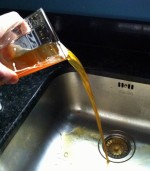“Alcohol was my friend, actually more like an unfaithful lover, but it helped me to be somebody; it gave me a new person to become and a newfound confidence. It helped me to be free, to be my new self. You might say that I had been borne again, not by flesh and blood but by a bottle.”
This excerpt, from Anthony Burgess’ novel, Rediscovering Identity, encapsulates perfectly the dichotomy of the Drink as more than just that: its transformative, unparalleled ability to shift our fears and insecurities in and out of focus to a plane just on the periphery of consciousness. Yet, as Burgess points out, when we realize that these “transformative powers” come at the price of our homes, our health, and our families, it is the betrayal of alcohol’s infidelity that strikes us. Nevertheless, we return, stuck in a pattern reminiscent of a jilted spouse. An apt analogy to be sure, and one which breweries, unsurprisingly, are being sharply admonished for capitalizing on. Most recently, Heineken posted an ad on its YouTube page depicting its subsidiary, Strongbow, as the “significant other” in the speech of a nominee, Carl, who has just won the penultimate prize at an awards show. According to an article posted on Independent:
“A message read out on Carl’s behalf said: ‘I dedicate this award to my family, to all the lovely creatures out there, and to my other half. I love you. I’ve loved you since the first day I met ya. And I always will do. My dear Strongbow.’”
Now, obviously the ad was a parody, and Heineken said as much following all of the steep criticism it would receive once the Youth Alcohol Advertising Council (YAAC) and Alcohol Concern. However, the latter’s concerns are valid, regardless of intent on the brewers’ end—which, by the way, is to sell beer—and one can’t help but raise an eyebrow at the cocksure idea of expressing the value of a beverage as an equal partner in a marital situation. The fact of the matter, as silly as it is sad, is that there are a lot of alcoholics who truly do put their addiction before relationships with other people, whether it be friends, co-workers, or family. It’s no coincidence that dependence results in the loss and breakdown of the home, in divorce, and in loneliness.
Despite there being no other complaints against the ad, the Advertising Standards Authority deemed that the Heineken had breached its standards when it produced a message that depicted Carl—and make no mistake, Carl is representing ‘us’, the viewer—as perceiving alcohol to be an adequate (ideal?) alternative to an actual romantic partner.
Says Tom Smith, Alcohol Concern’s head of policy:
“Not only is it appalling that a company such as Heineken UK, with a marketing budget of millions, is failing to comply with the advertising codes, but it’s left to young people to spot these adverts and highlight these failings.”
In line with the latter thinking, MP Fiona Bruce, chairwoman of the All Party Parliamentary Group on Alcohol Harm, noted that many young people in their teens are making the decision to put off drinking until their 20s, a decision which warrants applause when you consider that much of the issue with alcoholism stems from the decision to drink early in life. They are “becoming more aware” of the reality of binge-drinking and long-term effects—in the UK, where this issue is being highlighted, the drinking age is 18, but those a couple years younger can get away with consuming beer, wine, or cider if it is bought with a meal, and they are accompanied by an adult.
In the end, it would seem that harsher consequences for advertising violations, as well as the institute of some kind of watchdog organization, may be in order to prevent similar flagrant behavior in the future.








